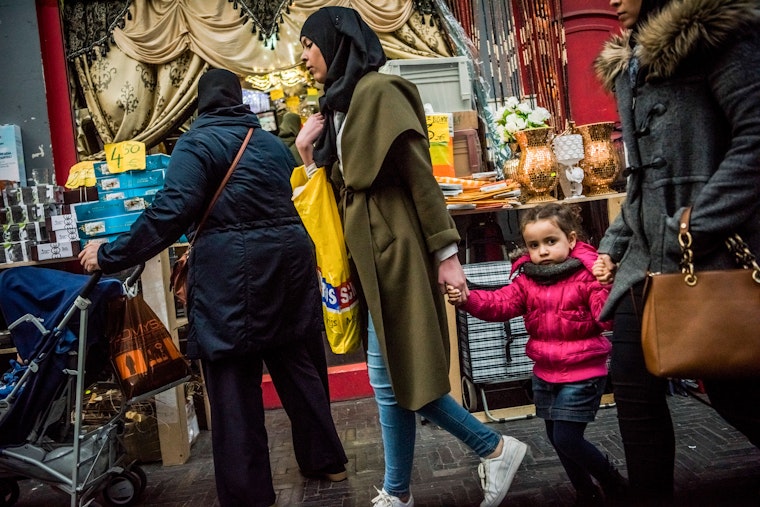Case Watch: A Victory in Europe for Muslim Women’s Right to Wear a Headscarf
By Simon Cox

In our "Case Watch” reports, lawyers at the Open Society Justice Initiative provide analysis of notable court decisions and cases that relate to their work to advance human rights law around the world.
Europe’s top human rights court has ruled that a Belgian court violated Hagar Lachiri’s freedom of religion by ordering her to take off her headscarf before she attended a hearing. The use of the law—which requires persons in a Belgian court to have their heads uncovered—was found by the European Court of Human Rights (ECHR) to be an unjustified interference with religious freedom.
The court ruled that banning a woman just for wearing her headscarf was not necessary to keep order in court proceedings. This is the first time the ECHR has ruled in favor of Muslim women’s freedom to wear a headscarf. The important decision raises protection for religious minorities and brings more clarity and honesty to debates about headscarf bans. It changes law in Belgium, which is home to some of Europe’s most arbitrary and repressive practices against Muslim women’s freedoms.
In 2007, Lachiri was a civil party to court proceedings investigating the death of her brother. When she sought to attend a hearing about the case, the court ordered that she be denied entry because of the headscarf she wears as a Muslim. She challenged the decision before the Belgian courts and then the ECHR.
The Belgian court’s decision to exclude Lachiri relied on a law from the nineteenth century. Under this rule, people attending court hearings must have their heads uncovered. The Belgian government defended the law on the ground of the need to keep order in court. But Lachiri argued that her headscarf did not disrupt the court and that the law was not used against other people with covered heads—such as Christian nuns, or Sikh and Jewish men. A study presented to the European Court by the University of Gent found only 20 percent of judges had ever used the law, and most of the other judges would only use it for a disruptive person.
The seven judges in the Strasbourg court divided three ways on the case, with six of them finding a violation.
Four of the judges decided there had been a violation of the human rights requirement that any interference with religious freedom is “necessary.” The Belgian government did not claim Lachiri’s headscarf would actually disrupt the hearing, so the judges decided that the use of the law in her case was not necessary.
Two of the judges wanted to uphold Lachiri’s case under the rule that a human rights interference must be “prescribed by law” and therefore sufficiently predictable. These judges considered the Belgian courts’ use of the law on uncovered heads too inconsistent to meet this requirement; notably, they relied on the evidence from Gent University and the decision of the Court of Cassation to allow Lachiri to be present wearing a headscarf at their hearing of her appeal.
One judge would have dismissed the case, considering that denying Lachiri entry to the court hearings was not a disproportionate interference with her religious freedom, even though the hearings concerned her brother’s death.
The Belgian government did not argue that the law was based on secularism or “neutrality.” Unlike France and Turkey, the Council of State in Belgium has ruled that genuine neutrality requires inclusion and equality of different religions and cultures. Despite this, the judges in Lachiri’s case mentioned Strasbourg rulings, such as Leyla Sahin v. Turkey, which upheld headscarf bans in those states where “neutrality” is used to exclude people from institutions and public space. But since the Belgian government had not claimed neutrality as the aim of the law used in Lachiri’s case, the Strasbourg court did not base its decision on those cases.
The judgment is an important step in European protection of the human rights of Muslim women. It comes after many years of defeats for such claimants in the Strasbourg court and, most recently, the Court of Justice of the European Union. The recent Open Society Justice Initiative publication Restrictions on Muslim Women’s Dress in the 28 EU Member States reported on the many rules and practices Belgium uses to try to control what Muslim women wear. These include bans on wearing the headscarf at school, work, and public space—even an ice cream parlor had sought to ban customers. Although Belgian courts have outlawed some of these rules, politicians have failed to properly implement their decisions.
The majority’s ruling means states may now be unable to use some generalized laws about head covering against Muslim women. For these decisions to be lawful, states may have to show that the decision was necessary for the aim of the law. Wearing a headscarf doesn’t itself affect order in court. So European courts should no longer be able to use that justification for telling women to uncover their heads.
The two judges who concurred pointed out that a law banning head coverings must be applied consistently. Under European human rights law, judges cannot refuse access to the court for Muslim women who wear the headscarf unless they would do the same for other people who cover their heads. In practice, state authorities that impose clothing rules which are supposedly based on keeping order—or “neutrality”—do not then use them consistently. The Strasbourg reasoning in this case shows that this inconsistency may be breaking the requirement for laws to be “predictable.”
The parties now have three months during which they can ask for a review by the Grand Chamber of the Court. In theory, Belgian’s government can attempt a wider argument based on “neutrality.” But this will be hard, given the decisions of Belgium’s courts on that concept, and because the head-covering law has no apparent connection to neutrality.
If the judgment is not reviewed, then Belgium must implement it, under the oversight of the Council of Ministers. This could lead to the removal of the specific law about uncovered heads, leaving judges with sufficient powers to deal with actual threats to order in their courtroom. In the meantime, it is hoped that the minority of Belgian judges will join the majority and ensure access to their court for Muslim women—as well as anyone else wearing nondisruptive headgear.
Until December 2019, Simon Cox was a migration lawyer for the Open Society Justice Initiative.
